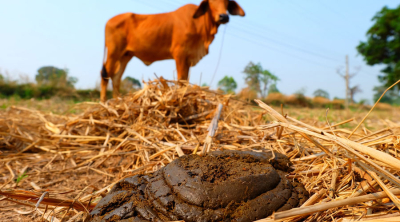
Cow dung has several uses – as fuel, mosquito repellent, thermal insulator, and even as a component in mud brick housing. But, its most common and popular use is perhaps as manure. As a natural agricultural fertilizer, such manure eliminates the use of harmful chemicals, keeping the soil healthy. You may also have heard of vermicomposting where the likes of earthworms consume organic waste and excrete what we can use as manure. But these aren't the only creatures whose poop have their uses. Come, let's find out more about this.
Whale poop
Whales are at the top of the food pyramid, meaning these large creatures play a huge role in keeping their marine ecosystem going. In fact, so huge that even their poop is important. Whales feed on deep sea creatures and move to the surface to breathe and And this poop is loaded with nutrients such as phosphorus. What whales do is essentially bring nutrients from the deep sea to the ocean surface. Phytoplankton and algae consume whale poop, and these organisms become food to zooplankton such as krill. Zooplankton, in turn, are food for the likes of fish and birds. And, through the latter, nutrients are carried from water to land.
Guano
The poop of birds (particularly seabirds) and bats is called guano. Just like whale poop, guano too is rich in nutrients – such as nitrogen, phosphorus, calcium, and potassium. Around the mid-19th Century, it was discovered that "nitrogen added to soil would drastically improve crop yields – particularly in the form of guano". Gradually over the years, its popularity spread the world over. This organic fertilizer can be used for raising vegetables, nut- and fruit-bearing trees, and even for ornamental plants and lawns.
Frass
Frass is the poop of insect larvae. Frass deposits on soil are said to have a great impact on soil fertility due to their high nutrient and labile carbon (which breaks down easily and is nutritious) content. Frass also contains "small concentrations of micronutrients", which may further be beneficial for crops. Since the world is contemplating ways to increase protein-rich insect consumption among humans, reports suggest that interest in increasing insect population is high. Which could also mean increase in frass availability.
Did you know?
Since there are "huge declines in whale, seabird and fish populations", the movement of nutrients from water and land "has slowed". Researchers "reckon that only a quarter as much phosphorus makes it to surface waters today compared with the past. And the flow of phosphorus to land has nearly stopped- at just 4 percent of historic levels". But this scenario is still reversible if we focus on restoring species, learn to share the planet with them- rather than locking them up in zoos or even confining them to protected areas and let them roam the world.
Picture Credit : Google




